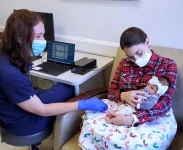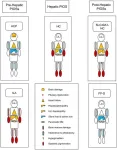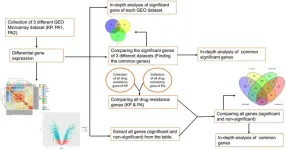(Press-News.org) HOUSTON and ALBUQUERQUE, N.M. ― A national study led by researchers at The University of Texas MD Anderson Cancer Center and The University of New Mexico (UNM) Comprehensive Cancer Center found major gaps in breast, cervical and colorectal cancer screening use in Federally Qualified Health Centers (FQHCs) in the U.S., relative to overall screening rates in the country.
The findings, published today in JAMA Internal Medicine, revealed screening use in FQHCs was 45.4% for breast cancer, 51% for cervical cancer and 40.2% for colorectal cancer, compared to cancer screening rates in the general American population of 78.2%, 82.9% and 72.3%, respectively.
“FQHCs provide high-quality primary care to underserved communities in the U.S., which are disproportionately comprised of racial and ethnic minorities, people without health insurance, and those living below the poverty level,” said study author Jane Montealegre, Ph.D., associate professor of Behavioral Science at MD Anderson. “These findings highlight an urgent need to focus on scaling up evidence-based screenings in these populations to mitigate cancer disparities.”
The U.S. Preventive Services Task Force (USPSTF) offers guidance for the general population to get screened for breast, cervical and colorectal cancer based on age and family history. However, screening use remains suboptimal in many marginalized populations. About 30 million people in the U.S. who might not otherwise have access to medical services currently use FQHCs.
The study, led by postdoctoral fellow Trisha Amboree, Ph.D., examined screening information from the Health Center Program Uniform Data System from 1,364 FQHCs between January 1 and December 31, 2020. To understand screening in the general population, researchers evaluated data from the Behavioral Risk Factor Surveillance System, which includes the use of preventive health services for non-institutionalized U.S. adults over the age of 18, during the same time period.
Researchers found cancer screening use in FQHCs varied widely across states. Certain states, such as Maine and New Hampshire, achieved screening rates over 60% and others fell below 35%, including Utah, Wyoming and Alabama. Additionally, the study revealed underscreened populations served by FQHCs in specific states contributed to a large proportion of America’s overall underscreened population. Experts attribute these differences, in part, to the variability of state screening programs and policies around healthcare funding.
“FQHCs face financial constraints and staff turnover while trying to provide care in a fragmented health system. Implementing clinical preventive services such as cancer screenings will require additional support,” said corresponding author Prajakta Adsul, M.B.B.S, Ph.D., assistant professor of Internal Medicine at UNM. “With investments in implementation research in FQHCs, there is potential to mitigate screening-related disparities in medically underserved populations.”
Limitations of the study include self-reporting in the datasets and potential effects from the COVID-19 pandemic.
The research was supported by the National Institutes of Health (R01MD013715, R01CA232888, R01CA256660). A full list of collaborating authors and their disclosures can be found here.
in the MD Anderson Newsroom.
END
Cancer screening rates are significantly lower in US federally qualified health centers
Study finds breast, cervical and colorectal cancer screening substantially lower in clinics serving underrepresented communities compared to overall national and state rates.
2024-04-29
ELSE PRESS RELEASES FROM THIS DATE:
Nature's nudge: Study shows green views lead to healthier food choices
2024-04-29
Natural scenery typically conjures up positive emotions and a sense of wellbeing for most individuals. A new study by INSEAD shows that verdant views can also nudge people to pick healthier food.
Published in Communications Psychology, a new journal by Nature, the study suggests that spending time in a natural setting, such as walking in a park (vs. on city streets), or simply viewing greenery outside the window (vs. an urban view), leads people to make healthier food choices afterward.
“Our ...
AI algorithms can determine how well newborns nurse, study shows
2024-04-29
A modified pacifier and AI algorithms to analyze the data it produces could determine if newborns are learning the proper mechanics of nursing, a recent study shows.
Specifically, the researchers from the University of California San Diego measured if babies are generating enough suckling strength to breastfeed and whether they are suckling in a regular pattern based on eight independent parameters.
The results, published in the April 18 online edition of IEEE Journal of Translational Engineering ...
Scientists develop new organoid model to study thymus function
2024-04-29
Researchers from the Organoid group have developed a new organoid model that can be used to study the thymus. The organoids, derived from mouse thymus tissue, specifically model thymic epithelial cells (TECs). These cells are responsible for training the T cells of the immune system to properly respond to pathogens. It is the first laboratory model that enables long-term culture of TECs, which presents new opportunities to study their function. Ultimately, this could also bring new insights into the treatment ...
A revised classification of primary iron overload syndromes
2024-04-29
Background and Aims
The clinical introduction of hepcidin25 (Hep25) has led to a more detailed understanding of its relationship with ferroportin (FP) and divalent metal transporter1 in primary iron overload syndromes (PIOSs). In 2012, we proposed a classification of PIOSs based on the Hep25/FP system, which consists of prehepatic aceruloplasminemia, hepatic hemochromatosis (HC), and posthepatic FP disease (FP-D). However, in consideration of accumulated evidence on PIOSs, we aimed to renew the classification.
Methods
We ...
Expanding health equity by including nursing home residents in clinical trials
2024-04-29
INDIANAPOLIS – Clinical trials are constantly being designed and study participants enrolled to determine if medical treatments and therapies are safe and effective. Much has been written about the importance of including diverse populations in these trials.
However, the nearly 1.4 million individuals who live in the 15,600 nursing homes across the U.S. have been largely left out of clinical trials, despite the prevalence of such common conditions as hypertension, depression, diabetes and Alzheimer’s disease in this population.
A commentary by faculty of Regenstrief Institute, Indiana University, UCLA ...
Identification and exploration of transcripts involved in antibiotic resistance mechanism of two critical superbugs
2024-04-29
Background and objectives
Infectious diseases caused by pathogenic strains of bacteria are a global cause of morbidity and mortality. Hospital-acquired infections caused by Klebsiella pneumonia and Pseudomonas aeruginosa were found vulnerable during the COVID-19 pandemic. They are also responsible for the onset of certain life-threatening infectious diseases such as cystic fibrosis, endocarditis, bacteremia, and sepsis. Looking into the importance of these two superbugs there is a strong need for extensive comparative differential gene expression analysis ...
Quantum fiber optics in the brain enhance processing, may protect against degenerative diseases
2024-04-29
WASHINGTON, DC – (April 26, 2024) The effects of quantum mechanics—the laws of physics that apply at exceedingly small scales—are extremely sensitive to disturbances. This is why quantum computers must be held at temperatures colder than outer space, and only very, very small objects, such as atoms and molecules, generally display quantum properties. By quantum standards, biological systems are quite hostile environments: they’re warm and chaotic, and even their fundamental components—such as cells—are considered very large.
But ...
Icahn School of Medicine at Mount Sinai names Miriam Merad, MD, PhD, as Dean for Translational Research and Therapeutic Innovation
2024-04-29
New York, NY [April 29, 2024]—Miriam Merad, MD, PhD, a world-renowned immunologist, has been appointed Dean for Translational Research and Therapeutic Innovation of the Icahn School of Medicine at Mount Sinai. The appointment reaffirms Icahn Mount Sinai’s commitment to pioneering medical progress and catalyzing the rapid advancement of research innovation.
Dr. Merad, the Mount Sinai Professor in Cancer Immunology, will also continue to serve as the founding Chair of the Department of Immunology and Immunotherapy, Director of the Marc and Jennifer Lipschultz Precision Immunology Institute, and Director ...
Details of hurricane Ian’s aftermath captured with new remote sensing method
2024-04-29
Category 4 Hurricane Ian made landfall in Florida’s Lee County on Sept. 28, 2022, battering the region with wind speeds of 155 miles per hour and storm surge up to 13 feet – the highest storm surge documented in Southwest Florida in the past 150 years.
In the aftermath of a disaster, rapidly assessing damage is critical for rescue, recovery and emergency planning. Damage assessments are typically conducted through field reconnaissance deployments, which can be labor-intensive, costly and risky. Moreover, field-based emergency response ...
Robots can’t outrun animals. A new study explores why
2024-04-29
The question may be the 21st century’s version of the fable of the tortoise and the hare: Who would win in a foot race between a robot and an animal?
In a new perspective article, a team of engineers from the United States and Canada, including University of Colorado Boulder roboticist Kaushik Jayaram, set out to answer that riddle. The group analyzed data from dozens of studies and came to a resounding “no.” In almost all cases, biological organisms, such as cheetahs, cockroaches and even humans, seem to be able to outrun their robot counterparts.
The researchers, led by Samuel Burden at the University of Washington and ...
LAST 30 PRESS RELEASES:
Justice after trauma? Race, red tape keep sexual assault victims from compensation
Columbia researchers awarded ARPA-H funding to speed diagnosis of lymphatic disorders
James R. Downing, MD, to step down as president and CEO of St. Jude Children’s Research Hospital in late 2026
A remote-controlled CAR-T for safer immunotherapy
UT College of Veterinary Medicine dean elected Fellow of the American Academy of Microbiology
AERA selects 34 exemplary scholars as 2026 Fellows
Similar kinases play distinct roles in the brain
New research takes first step toward advance warnings of space weather
Scientists unlock a massive new ‘color palette’ for biomedical research by synthesizing non-natural amino acids
Brain cells drive endurance gains after exercise
Same-day hospital discharge is safe in selected patients after TAVI
Why do people living at high altitudes have better glucose control? The answer was in plain sight
Red blood cells soak up sugar at high altitude, protecting against diabetes
A new electrolyte points to stronger, safer batteries
Environment: Atmospheric pollution directly linked to rocket re-entry
Targeted radiation therapy improves quality of life outcomes for patients with multiple brain metastases
Cardiovascular events in women with prior cervical high-grade squamous intraepithelial lesion
Transplantation and employment earnings in kidney transplant recipients
Brain organoids can be trained to solve a goal-directed task
Treatment can protect extremely premature babies from lung disease
Roberto Morandotti wins prestigious Max Born Award for pioneering research in quantum photonics
Scientists map brain's blood pressure control center
Acute coronary events registry provides insights into sex-specific differences
Bar-Ilan University and NVIDIA researchers improve AI’s ability to understand spatial instructions
New single-cell transcriptomic clock reveals intrinsic and systemic T cell aging in COVID-19 and HIV
Smaller fish and changing food webs – even where species numbers stay the same
Missed opportunity to protect pregnant women and newborns: Study shows low vaccination rates among expectant mothers in Norway against COVID-19 and influenza
Emotional memory region of aged brain is sensitive to processed foods
Neighborhood factors may lead to increased COPD-related emergency department visits, hospitalizations
Food insecurity impacts employees’ productivity
[Press-News.org] Cancer screening rates are significantly lower in US federally qualified health centersStudy finds breast, cervical and colorectal cancer screening substantially lower in clinics serving underrepresented communities compared to overall national and state rates.










